| Reviews & Columns |
|
Reviews DVD TV on DVD Blu-ray 4K UHD International DVDs In Theaters Reviews by Studio Video Games Features Collector Series DVDs Easter Egg Database Interviews DVD Talk Radio Feature Articles Columns Anime Talk DVD Savant Horror DVDs The M.O.D. Squad Art House HD Talk Silent DVD
|
DVD Talk Forum |
|
|
| Resources |
|
DVD Price Search Customer Service #'s RCE Info Links |
|
Columns
|
|
|
Elvis: MGM Movie Legends Collection (Follow That Dream, Kid Galahad, Frankie and Johnny, Clambake)
FOLLOW THAT DREAM
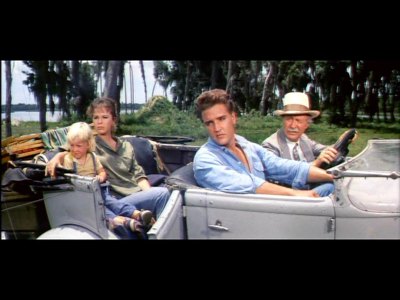
A forgotten, overlooked gem in Elvis' early movie career, Follow That Dream, based on the satirical novel, Pioneer, Go Home! by Richard P. Powell, tells the story of the itinerant Kwimper clan, headed up by enthusiastic government welfare recipient Pop (Arthur O'Connell) and his supernaturally naïve but superhumanly strong son, Toby Kwimper (Elvis Presley). Heading through Florida in their broken-down jalopy, Toby and Pop set up temporary housekeeping on a little spit of sand, adjacent to a new state highway, when they run out of gas. In addition to Toby and Pop, orphans Holly Jones (Anne Helm), Adriane Pennington (Pam Ogles), and twins Eddy and Teddy Bascombe (Gavin and Robin Koon), make up this happy, carefree extended family, and they settle right in, building a lean-to and digging a well for drinking water.
The Kwimpers are put on notice, though, by state highway inspector H. Arthur King (Alan Hewitt), that they're trespassing on government land, and that they're to move off it immediately. However, when the state governor (Harry Holcombe) comes by on his way to dedicate the new highway, he sides with ornery, contrary Pop, who declares the property his, and states his intention to homestead the unmapped, unincorporated land. Humiliated in front of the governor, King vows revenge. Meanwhile, Holly discovers that tourists would be willing to pay for the privilege of fishing off their land, after Toby allows a wealthy fisherman, who turns out to be the local bank manager Mr. Endicott (Herbert Rudley), fight a big fish Toby had hooked. This spurs Holly to seek a bank loan from Mr. Endicott, to expand their successful fishing operation.
Unfortunately, forces conspire to end the Kwimpers' idyllic life. Supervisor King enlists the aid of social worker Alisha Claypool (Joanna Moore) to write a report, deeming Toby and Pop unfit guardians of the Teddy, Eddy and Adriane (the children were never legally adopted). As well, a trailer housing a floating crap game soon shows up on the unincorporated land, with gangsters Carmine (Jack Kruschen) and Nick (Simon Oakland) busily taking advantage of the police-free zone. But what neither of these parties count on is the single-minded (or is it simple-minded?) determination of Toby to keep the family together.
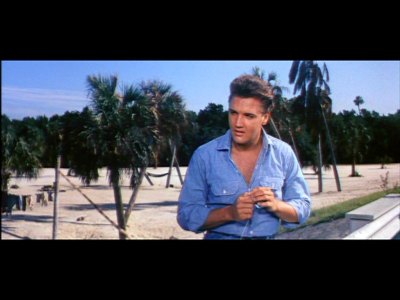
Although it didn't receive any serious attention from critics when it premiered in 1962 (and ticket sales, although respectable, weren't overwhelming from Presley fans) Follow That Dream is one of Elvis's best films, featuring a quietly astute, relaxed comedic performance by Presley that may surprise viewers who've only seen his more popular roles. Working away from producer Hal Wallis this time (which only helped), Elvis comes off relaxed and sweet and wonderfully funny here, thanks to help from a talented production crew. Old pro director Gordon Douglas (Them!, In Like Flint, The Detective), working from a truly witty, nicely integrated screenplay by Charles Lederer (His Girl Friday, Ocean's Eleven) and an uncredited Herman Raucher (Summer of '42), manages to elicit a charming performance from Elvis. Even though earlier comedies G.I. Blues and Blue Hawaii had been monster hits with the public, they didn't really require much in the way of performance from Elvis; the songs and the locales took care of much of the box office for those films. Here, the low-key plot is entirely dependent on Elvis pulling off a believable character, which he does winningly.
In a film where the laughs must come from the audience being in on the gag - believing that sincere, genuine Toby doesn't really understand the impact his actions have on others, while being totally unaware of the true nature of various threats around him - success demands a subtle performance, and Elvis does fine by it. Reverting back to his natural sandy blonde hair color, Elvis can't be more relaxed here; he looks so much more comfortable without that fake, ink-black glob of hair on his head. Without the forced trappings he's so often shackled with in his movies - babies and kids to sing to, phony Playboy-era occupations like race car driver, helicopter pilot, or speedboat racer, scads of women to seduce - Elvis has a chance to settle down into a role, and make it his own.
And it's a finely crafted character, too. Toby, who always remains obtusely polite in the face of insults and jibes, can't help but succeed over forces that work against him because he's totally oblivious to the real threat they pose. When some thugs "pretend" to show him how he's going to get hurt if he doesn't do what they say, Toby takes it as a straight demonstration, and promptly wipes them out. And naturally, he's sorry afterwards, apologizing as he fans the unconscious mobsters. There are numerous laugh-out-loud moments like that in Follow That Dream, including Elvis' reliance on his multiplication tables anytime a woman gets too close to him, or the comic showdown with the gangsters called in from Detroit, with Elvis popping up behind them repeatedly, like a jack-in-the-box, scaring the hell out of them - moments you won't find in later Elvis films. In fact, that's what's so special about Follow That Dream: it doesn't really feel like an "Elvis Presley film." It's its own film first, which just happens to star Elvis. And it's marvelous.
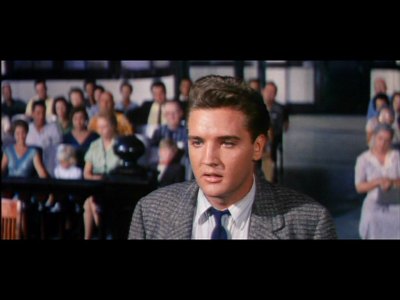
The DVD:
The Video:
Now here's the bad news: the non-anamorphic, 2.35:1 widescreen video image for Follow That Dream (the same one used for the film's first DVD release in 2001) is one of the worst transfers I've ever seen on DVD - period. Not only is the print faded out and pink in many places, with tons of dirt and scratches, but there are compression issues galore on this double-sided, single layer disc. The flip side holds a full frame, 1.33:1 transfer, which is pointless. A truly awful transfer.
The Audio:
The Dolby Digital English mono soundtrack is largely uninvolving, but it accurately reflects the original theatrical presentation. There's also a Spanish mono soundtrack, too. Subtitles are available in English, Spanish and French. Close-captioning is also available.
The Extras:
Only an original trailer for Follow That Dream is included here - and its color looks better than the feature film transfer.
Final Thoughts:
One of Elvis' best performances in his most charming film, little seen Follow That Dream will surprise the casual Elvis fan with its witty, knowing efficiency. Unfortunately, you're better off finding an old VHS copy of the film somewhere, because the old DVD transfer here is horrendous. This important film in Elvis' career needs restoration - now.
KID GALAHAD
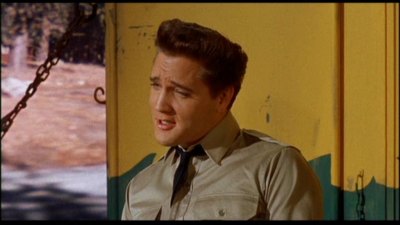
Coming right after Follow That Dream, Elvis stars in the boxing flick, Kid Galahad, finishing up his two-picture deal with the Mirisch brothers (who produced primarily through United Artists). A remake of the 1937 Warner Bros. version that starred Edward G. Robinson, Bette Davis, Humphrey Bogart, and Wayne Morris. Elvis plays Walter Gulick, a newly discharged G.I. returning to the place of his birth, Cream Valley, in upper state New York (the real location is Idyllwild, California). Hoping to score a job as an auto mechanic (Walter dreams of settling down and opening his own garage), Walter finds himself at the boxing camp run by debt-riddled gambler Willy Grogan (Gig Young). Meeting Willy's sympathetic "fiancé" Dolly Fletcher (Lola Albright), Walter picks up a free breakfast, but no job, since Willy's finances are so precarious (his car was just repossessed).
Willing to work at anything to make money, Walter agrees to spare with Joie (Michael Dante), a champ staying at Grogran's. After taking a beating by Joie (which doesn't seem to phase Walter), Walter knocks out Joie with one punch - and Willy sees dollar signs. Despite warnings from corner man and trainer Lew (Charles Bronson) that Walter is totally inexperienced (he boxed a few fights in the Army), as well as disapproval from Dolly, who thinks, along with Lew, that Walter is a nice kid, Willy pushes past their objections, cynically buddying up to Walter in order to use him. But Willy is suddenly facing more trouble than he expected when first his sister Rose (Joan Blackman) comes to the camp to straighten out the finances (she owns a half-interest in the camp), and second, mobster Otto Danzig (David Lewis) demands that Willy house two of his goons to keep an eye on Willy until a congressional hearing on boxing has already convened (Willy was witness to a murder of a boxer by the mob, and testified at Congress about it). Soon, when it becomes clear that Walter is a boxing savant (he knocks out one of the goons for disrespecting Dolly, earning the nickname "Kid Galahad"), Danzig wants Willy to help throw an important fight the Kid is in, so the mob can clean up on the bets.
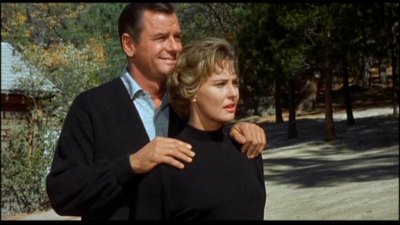
For Kid Galahad, Elvis reteamed with producer David Weisbart (Rebel Without a Cause, Love Me Tender, Flaming Star, Follow That Dream), and the results are again noticeable improved over regular producer Hal Wallis. Even though this 1962 updating doesn't pack the punch (sorry) of the original Michael Curtiz-directed effort, it's still miles above the Presley fare that was soon to come. Elvis doesn't convince us for a second that he's a boxer (he was reportedly unhappy about his recent weight gain, although he looks bulkier, rather than heavy), but director Karlson does a good enough job overcoming that by keeping the camera in tight during most of his boxing scenes.
There's always been a lot of discussion about the trajectory of Karlson's career, and how after the initial promise of films like Kansas City Confidential and Tight Spot, he was "reduced" to making films like Kid Galahad. That may be true, but another way to look at it is Elvis was (very rarely) saved in his films by working with a competent director like Karlson. Karlson, no stranger to violence in his films, gets the mob angle of Kid Galahad just right, bringing a weight to those scenes that feels more suited for a speedy programmer, not an "Elvis Presley musical"(one suspects the "torture" scene of Bronson at the hands of the mob goons - effectively hinted at by extreme close-ups of Gig Young and Bronson - was probably more explicitly shot, before being trimmed for the expected family audiences).
Indeed, the dramatics of Kid Galahad feel quite far away from the typical Presley musical. It's made clear that Gig Young (adept as always with a light comical/dramatic role) is "keeping" Lola Albright (sexy, with a hint of deeper emotions churning underneath), while Presley's romancing of Rose, although stock for these kinds of films, plays out much more naturally than you're going to see in later Elvis musicals. Blackman and Presley have a nice rapport together (they had previously co-starred in the slight but fun Blue Hawaii); I especially like how Karlson injects a little spontaneity into one of Elvis' singing numbers, I Got Lucky, by leaving in a take where Blackman, slipping out of character, is obviously tickled to death to be sung to by Elvis. It's such a natural moment, again shot in a tight, two-shot close-up, that it should be credited to Karlson, since you won't see too many scenes like it in the calcified later offerings with Elvis. At times obvious, and certainly no great shakes as a serious drama, Kid Galahad still manages to survive the shoehorning of a gritty programmer into a glossy Presley musical framework, resulting in a pleasant contradiction.
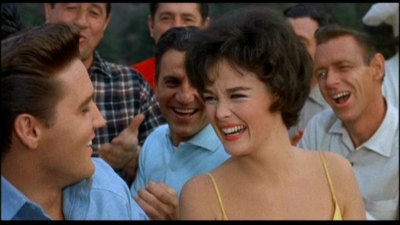
The DVD:
The Video:
Certainly the best looking transfer here in the Elvis: M-G-M Movie Legends Collection, Kid Galahad looks quite good in an anamorphically enhanced, 1.85:1 widescreen transfer. Grain crops up, which is expected, as do a few dirt specks, but overall, the colors are true, with good values. A bright, generally sharp picture.
The Audio:
As expected, the only sound mix from this old transfer is a Dolby Digital English mono. It's okay, with dialogue coming through cleanly. Subtitles are available in English and Spanish. Close-captioning is also available.
The Extras:
An original trailer is included for Kid Galahad.
Final Thoughts:
One of Elvis' last, strong dramatic parts is showcased nicely in director Phil Karlson's speedy, efficient boxing/crime/musical programmer, Kid Galahad. Catchy songs like This is Living and I Got Lucky (the opening number, King of the Whole Wide World, sung by Elvis as he rides on the back of a truck, is fun) help get you past the fact that Elvis never really convinces you he's a boxer. No dramatic heavyweight, Kid Galahad benefits from pros Young, Bronson, and Albright's presence, as well as an admirable focus on keeping the familiar story moving along.
FRANKIE AND JOHNNY
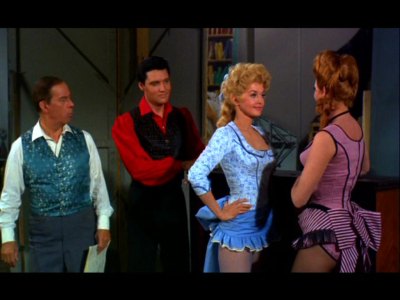
Certainly one of Elvis' most anonymous outings from the mid-60s, Frankie and Johnny tells the slight story of Johnny (Elvis Presley), a riverboat singer and inveterate gambler who can't keep two nickels in his pocket without betting them. Cozy with fellow singer Frankie (Donna Douglas), Johnny has the worst luck in the world until he visits an old gypsy fortune teller, who sells Johnny on the idea that he needs a tall redhead standing next to him, if he ever wants to win a bet. Fortunately, Clint Braden (Anthony Eisley), the owner of the riverboat, has a visitor come aboard: his redheaded girlfriend Nellie Bly (Nancy Kovack). Naturally, Johnny is smitten with her, especially after she accompanies him to the gaming tables, and he cleans up. Johnny, who watches all of this with growing anger, sets up Johnny with the old switcheroo during a costume ball, to see if he's faithful to her.
Directed anonymously by hack Frederick de Cordova (notorious for directing Ronald Reagan in Bedtime for Bonzo), from a threadbare, dull script by Alex Gottlieb (Susan Slept Here, The Great Sex War), Frankie and Johnny is a most depressing Elvis Presley musical, largely because it's neither good enough to recommend, nor bad enough to thoroughly enjoy for all the wrong reasons. It's totally enervated; its production and the cast assembled espousing not the slightest passion for it, or even at the very least, some mild interest. Elvis, looking full in the face with glazed over eyes, looks frankly ridiculous in the Yale sweaters and riverboat bandleader costumes he's made to wear, singing lame songs like Chesay and Petunia, the Gardner's Daughter (evidently, Elvis threw a fit when he heard the song selection for this particular film, and refused to sing along with the orchestra. His vocals, for the first time for one of his soundtracks, were laid down after the recording sessions). It's no wonder that grosses for Presley pictures and soundtracks (his major source of recording during the 1960s) were falling rapidly at this stage in his career. With weak films like Frankie and Johnny, fans began to wonder what happened to the King of Rock 'n' Roll - especially when he's dressed up like a high school majorette, singing faux-antique ballads that wouldn't make the roster on The Lawrence Welk Show.
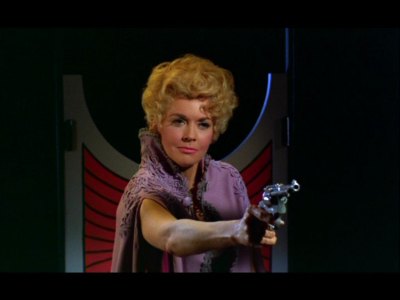
He's not exactly aided by his lackluster supporting cast here, either. Douglas, in her first co-starring feature film role since hitting it big on The Beverly Hillbillies, is competent as Frankie, but there's a reserve to Douglas, a certain standoffishness to her screen presence, that does little to endear us to her. Harry Morgan, a curious choice to be Elvis' comedic sidekick, is fine as always in his blustering performance, but he's given almost nothing to do in Frankie and Johnny. I wound up wishing he and the marvelous Audrey Christie as his wife Peg, had been the main focus of the film; they're great together. And bland Kovack and Eisley fail to register at all as the second leads.
Perhaps even more distressing than Presley's obvious inattention and the spotty supporting cast, is the cheap-jack look of Frankie and Johnny. It was Colonel Tom Parker's (Elvis' all-controlling personal manager) iron rule that budgets for Presley films stay well within the 2.5 million dollar range; gross participation for Elvis and more importantly, the Colonel, didn't start until that number was doubled in gross revenue - Presley movies were business schemes first, and artistic endeavors second (or third or fourth, many times). And Frankie and Johnny most obviously didn't go over budget. Garish paint and luridly colored costumes don't hide the fact that the small sets are pathetically undernourished. It's a cheap-looking film, too, with obvious lighting that looks more like a blown-out TV episode than a feature film. Lackluster direction, a tedious script for a do-nothing plot, and a distant Elvis all make Frankie and Johnny one of Elvis' most forgettable films.
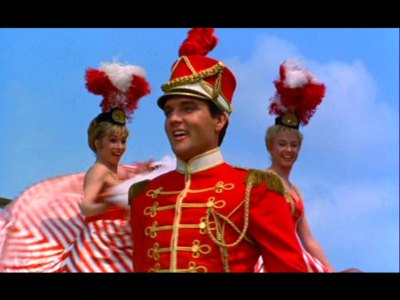
The DVD:
The Video:
The non-anamorphic, 1.66:1 widescreen transfer for Frankie and Johnny (again, the same one used for its previous DVD release) isn't the best, with plenty of dirt showing in the print from time to time (the opening credits are the worst, as well as the shoddy stock footage of the riverboat taken from M-G-M's Show Boat). But the colors are bright and fairly consistent.
The Audio:
The Dolby Digital English mono mix is serviceable, but seriously: do you really want to hear those songs? There's a Spanish mono mix, as well, along with Spanish and French subtitles. Close-captioning is available.
The Extras:
An over-hyped original trailer for Frankie and Johnny is included.
Final Thoughts:
One of Elvis' most boring musicals, Frankie and Johnny exists in cramped, impoverished, minimalist sets, while the music drones on and on, with no passion or conviction. An exercise in futility, which Elvis, his face a mask of indifference, clearly understands as such.
CLAMBAKE
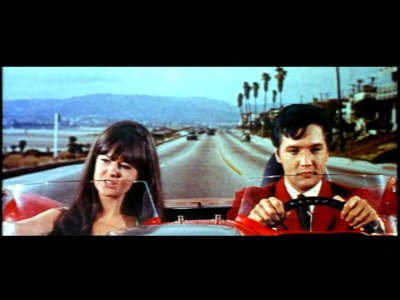
Generally considered some kind of tipping point in Elvis' movie career (as well as, perhaps, in his personal life), Clambake reworks the classic The Prince and the Pauper story to feature Elvis as Scott Heyward, multi-millionaire playboy and research chemist. Bored with his privileged life, and just barely escaping a marriage to a gold-digger, Scott by accident meets Tom Wilson (Will Hutchins), a water ski instructor on his way down to Miami to work at a big hotel. Sensing an opportunity to live his life without wondering if the girls he gets are attracted to his money and not him, Scott switches identities with Tom: he'll work as the ski instructor, and Tom, who's a loser with girls, will get to play rich for awhile.
Once at the hotel, Scott gives a ski lesson to Dianne Carter (Shelley Fabares), a poor girl who's saved up her money to come to Miami and snag a rich husband. Hoping to land James J. Jamison III (Bill Bixby), a rich pajama manufacturer and speed boat racer (I'm not making this up), she goes on a friends-only date with Scott, and asks his help in getting J.J. interested in her. Meanwhile, Scott, reworking an old hardening formula his father's chemical factory abandoned, hopes to take boat builder Sam Burton's (Gary Merrill) experimental speed boat and toughen up the hull, the better to beat J.J. at the climatic boat race - as well as beat him for Dianne's hand in marriage.
Clambake has become famous to fans of the Elvis movie canon, not so much for the film itself, but for the seemingly "perfect storm" of events in Elvis' personal and private life that converged before and during the shoot, and that made its production notoriously noteworthy. Elvis' spiraling drug addiction, his absolute frustration with his pathetic movie career, and his resulting deep depression when it became obvious he wasn't able to do anything about it, his looming marriage to Priscilla (which many interpreted as a half-hearted gesture, at best), the Colonel's insistence on 50% of all of Elvis' future earnings (in exchange for further micromanaging his life), the alarming decline in recent record sales and movie grosses, and Elvis' ballooning weight problem (further wrecking his sobriety when diet pills were disproportionately prescribed) all marked the Clambake shoot, and provide the Elvis fan with decidedly more interest than what's up on the screen.
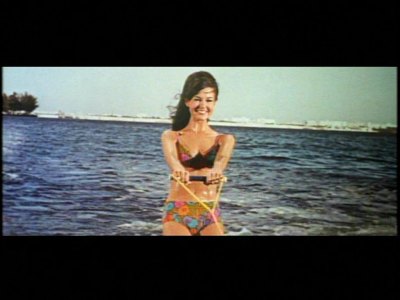
For what it is, Clambake isn't Elvis' worst film, but its nowhere near his better ones, either. For one thing, Elvis isn't in it as much as his other films. Quite a bit of time is taken up with Will Hutchins' incessant, yet at times amusing, mugging, Fabares' and Bixby's romancing, and scenes with Elvis' father, James Gregory. When Elvis does show up, it's rather a morbid experience. Much like the "Raintree County" game where fans watch to see which Montgomery Clift scenes are "pre" or "post" accident, one can watch Clambake and very readily spot Elvis pre and post diet. Some sequences even include the two as a bonus; the horrific Confidence number - hands down one of his worst movie songs ever - where Elvis sings to a bunch of kids in a playground, has Elvis entering the scene (on location) looking relatively normal, only to appear grossly overweight in the studio's playground mock-up. More disturbing than his physical appearance is his total disregard for the material, and for his own self-image. The Confidence song is bad enough (why the songwriters of that hideous High Hopes rip-off weren't sued, I'll never know), but frequently, Elvis is caught on camera, in huge close-up, seriously disconnected from whatever scene he happens to inhabit. And perhaps, disconnected from far deeper things. It's creepy to watch.
Some of the production numbers are entertaining, such as the elaborate central Clambake sequence, which looks like a cross between one of the Beach Party movies and an episode of Shindig, as well as the Hey Hey Hey number, that has Elvis laying kisses on some gorgeous-looking girls. Some of the set designs are rather good, too, and the location work - when those few bits and pieces do come up - are nicely composed. Unfortunately, rear-projection shots rule Clambake, with ridiculous mock-ups of Elvis water-skiing, riding a motorcycle, and powering a speedboat, ruining any sense of the film's "realism." Fabares, a frequent Elvis co-star, is absolutely adorable (she's like Barbie's kid sister Skipper, come to life); she's always bright and amusing, even though she's given nothing to do here. Bixby is suitably grating, and Gregory, one of my favorite character actors, manages to overcome that silly fake handlebar moustache they made him wear. The songs are eminently forgettable, although I do like Hey Hey Hey and the title song ("Clambake! Gonna' have a clambake!"). But let's face it; by this point, Clambake was a clear indicator that for all intents and purposes, Elvis' movie career, if you could even call it that at this stage, was over. The actor who wanted to be like his idols Brando and Dean, wound up closer to his other idol Tony Curtis, who was mired in mirthless Hollywood garbage by the mid-60s, as well.
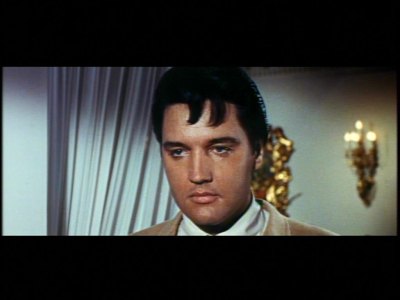
The DVD:
The Video:
Almost as bad as the Follow That Dream transfer, Clambake's non-anamorphic, 2.35:1 widescreen video image is dark, grainy, and soft. I've seen this title recently on TCM, and it looked ten times better than this old transfer.
The Audio:
The Dolby Digital English mono mix is dull, as to be expected, but everything is at least clear. There's also a Spanish mono mix available, along with Spanish and French subtitles. Close-captioning is available.
The Extras:
There's a cool vintage trailer for Clambake included here, making the film look a lot more fun than it really is.
Final Thoughts:
Known more for its backstage drama than for its content, Clambake didn't help Elvis' movie career, but it's not his worst film, as many contend. The title song is fun, Shelley Fabares is a doll, and there's one or two production numbers that have a little oomph. Too bad the script trots out the same old "Elvis Presley musical" clichés. And too bad Elvis is so clearly distracted and disconnected.
Final Thoughts on the Box Set:
Unfortunately, it's impossible to recommend the Elvis: M-G-M Movie Legends Collection. While one of Elvis' best movies is included here (Follow That Dream), as well as pretty good programmer Kid Galahad, only that film looks halfway decent in its transfer, while Follow That Dream and the sub-par Clambake look positively wretched. And frankly, who cares if Frankie and Johnny looks okay? With zero extra incentives to entice Presley fans, who are clamoring for restored prints and bonus features like commentaries, documentaries, and vintage promotional material, and who keep getting denied by lazy studios, there's absolutely no reason to purchase Elvis: M-G-M Movie Legends Collection. Rent individual titles if you're curious, but true Presley fans already have these discs.
Paul Mavis is an internationally published film and television historian, a member of the Online Film Critics Society, and the author of The Espionage Filmography.


|
| Popular Reviews |
| Sponsored Links |
|
|
| Sponsored Links |
|
|
| Release List | Reviews | Shop | Newsletter | Forum | DVD Giveaways | Blu-Ray | Advertise |
|
Copyright 2024 DVDTalk.com All Rights Reserved. Legal Info, Privacy Policy, Terms of Use,
Manage Preferences,
Your Privacy Choices | |||||||













